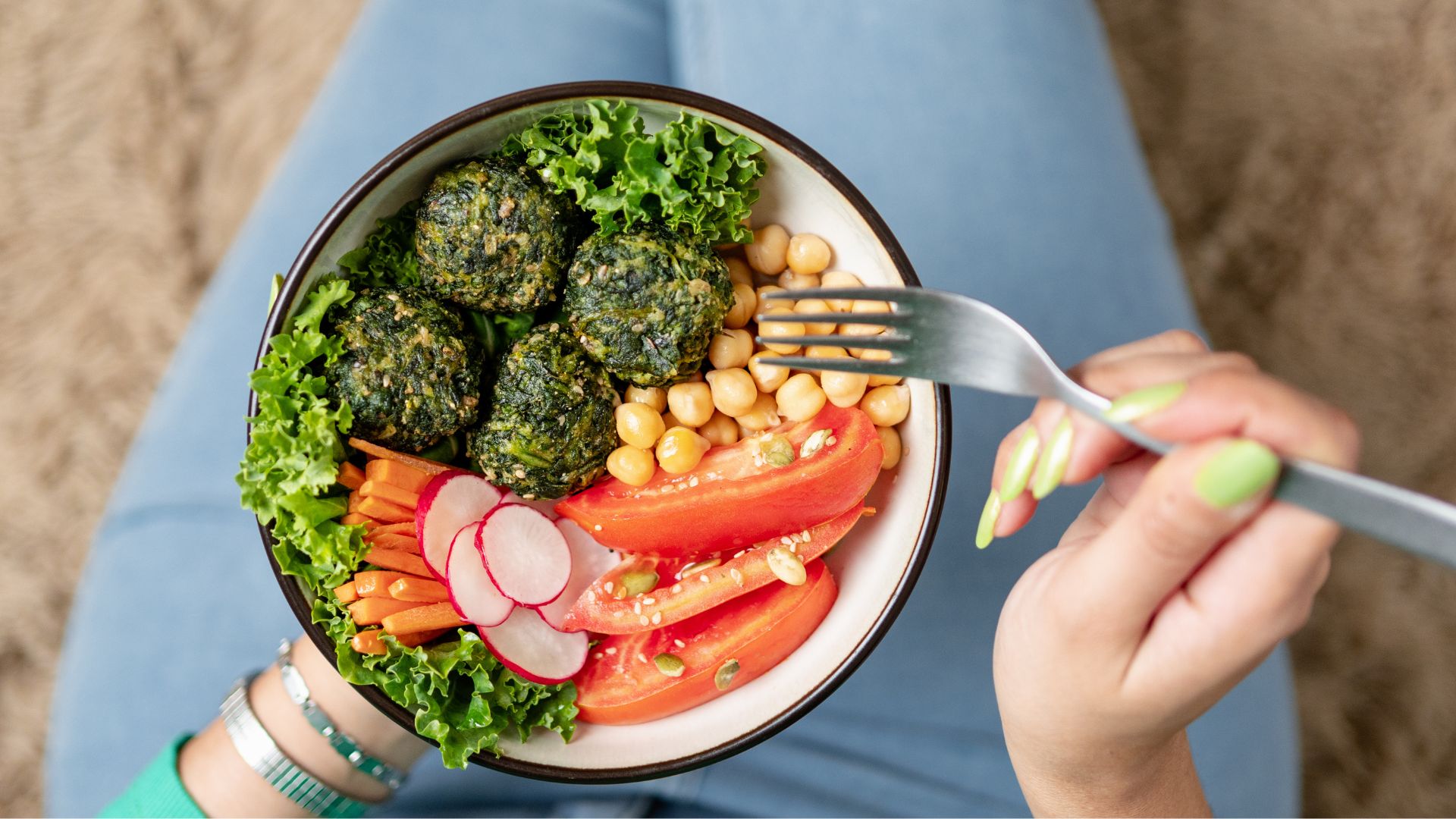
Embarking on the path of in vitro fertilization (IVF) can be an emotional rollercoaster filled with hope, uncertainty, and countless questions.
While medical procedures and protocols play a crucial role, did you know that the foods you eat can also significantly impact your fertility journey? 🍳🥦
In this comprehensive guide, we’ll explore how traditional Indian cuisine, bursting with flavor and nutrients, can be your ally during the IVF process.
Discover the power of folate-rich leafy greens, the importance of zinc for reproductive health, and much more.
Get ready to nourish your body and optimize your chances of success with every delicious bite! 🌿✨
Key Takeaways
| Nutrient | Benefits | Indian Food Sources |
|---|---|---|
| Folate | Prevents neural tube defects, promotes cell division | Spinach, amaranth leaves, fenugreek leaves |
| Zinc | Supports egg maturation, ovulation, sperm quality | Lean meats, legumes, nuts, whole grains |
| Iron | Transports oxygen, prevents anemia | Leafy greens, fortified cereals, legumes |
| Omega-3s | Regulate hormones, reduce inflammation | Fatty fish, flaxseeds, chia seeds, walnuts |
Fertility Superstars – Indian Foods That Pack a Nutritional Punch 🌟
Folate (Vitamin B9): The Pregnancy Powerhouse 💪
Folate, also known as vitamin B9, is a vital nutrient for anyone trying to conceive. It plays a critical role in preventing neural tube defects and promoting healthy cell division in the early stages of pregnancy.
According to the Centers for Disease Control and Prevention (CDC), even mild folate deficiency can increase the risk of birth defects.
The recommended daily intake of folate for women of childbearing age is 400 micrograms (mcg). Luckily, Indian cuisine offers an abundance of folate-rich options:
- Spinach (palak) – 1 cup (raw) provides 263 mcg of folate
- Amaranth leaves (chaulai) – 1 cup (cooked) provides 154 mcg of folate
- Fenugreek leaves (methi) – 1 cup (raw) provides 88 mcg of folate
Don’t forget about other excellent sources like lentils, chickpeas, and kidney beans (rajma). Aim to include at least 2-3 servings of these folate powerhouses in your daily diet.
Tip: Be mindful of overcooking vegetables, as this can destroy their folate content. Opt for steaming or quick stir-frying to preserve this vital nutrient.
To learn more about the IVF process and procedure, explore our in-depth guide. Discover the factors that influence IVF success rates and how a nutrient-dense IVF diet can support your journey.
Zinc: Essential for Egg and Sperm Health 🥚🌱
Zinc is a mineral that plays a crucial role in both male and female fertility. For women, it supports healthy egg maturation and ovulation, while in men, it contributes to sperm quality and motility.
Studies have shown that zinc deficiency can lead to hormonal imbalances, ovulation problems, and sperm abnormalities (source).
The recommended daily intake of zinc is 8 mg for women and 11 mg for men. Here’s a treasure trove of zinc-rich Indian food options:
- Lean meats, poultry, and fish (particularly shellfish)
- Legumes (lentils, chickpeas, beans)
- Nuts and seeds (pumpkin seeds, sesame seeds)
- Whole grains (brown rice, millets)
To maximize zinc absorption, consider soaking, sprouting, or fermenting whole grains and legumes, as phytates in these foods can slightly inhibit zinc uptake (source).
Iron: The Oxygen Carrier 🚆
Iron is essential for transporting oxygen throughout the body, which is crucial for both the mother and the developing baby.
Low iron levels can lead to anemia, impacting fertility and pregnancy outcomes.
The American College of Obstetricians and Gynecologists (ACOG) recommends that all women of childbearing age be screened for iron deficiency.
The recommended daily intake of iron for women of childbearing age is 18 mg.
Indian cuisine offers several iron-rich choices:
- Leafy greens like spinach (palak) and fenugreek leaves (methi)
- Fortified cereals (check iron content on the label)
- Legumes (lentils, chickpeas, beans)
Omega-3 Fatty Acids: Fighting Inflammation 🐟
Omega-3 fatty acids, particularly EPA and DHA, are crucial for fertility health. They help regulate reproductive hormones and reduce inflammation, which can hinder egg quality and implantation (source).
The Academy of Nutrition and Dietetics recommends consuming at least two servings of fatty fish per week.
However, be mindful of mercury content in certain fish. The FDA provides a handy guide to safe choices for women who are pregnant or trying to conceive.
Here are some lower-mercury options typically available in India:
- Pomfret (mahsang)
- Sardines (sardine)
- Shrimp (chingri)
For vegetarians, plant-based sources of omega-3s include:
- Flaxseeds (alsi) – rich in ALA, which the body can convert to EPA and DHA
- Chia seeds – another good source of ALA
- Walnuts (akhrot) – a convenient source of ALA
Remember to discuss your specific needs and any concerns about mercury with your doctor before increasing your fish intake.
As you embark on your IVF journey, let the vibrant flavors and nourishing ingredients of Indian cuisine be your guide.
By incorporating these fertility-boosting foods into your daily meals, you’ll be taking a proactive step towards optimizing your reproductive health and increasing your chances of success.
Putting Fertility Nutrition into Practice – Delicious Indian Meal Ideas 🍛🥗
Now that we’ve explored the key nutrients for fertility, let’s dive into how you can effortlessly incorporate these Indian food superstars into your daily meals.
Get ready to tantalize your taste buds with these nourishing and flavorful ideas! 🌶️✨
Vegetarian Meal Plan: A Symphony of Flavors and Nutrients 🎻🥬
Breakfast:
Spiced Chickpea Flour Pancakes (Poda) 🥞
Nutritional Benefits:
- Chickpea flour (gram flour) – good source of protein and folate
- Turmeric – anti-inflammatory properties
Step-by-Step Guide:
- Whisk together chickpea flour, turmeric, cumin, red chili powder (optional), and salt.
- Gradually add water to form a batter with a pouring consistency.
- Heat oil in a non-stick pan and pour a small ladleful of batter, spreading it into a thin circle.
- Cook for 1-2 minutes on each side until golden brown.
- Serve with chopped vegetables and low-fat yogurt for added protein and creaminess.
Greek Yogurt with Berries and Flaxseeds 🍓🌾
Nutritional Benefits:
- Greek yogurt – protein and calcium
- Berries – antioxidants
- Flaxseeds – plant-based omega-3s
Simple Recipe:
- Combine Greek yogurt with your favorite berries (fresh or frozen).
- Sprinkle ground flaxseeds on top for added texture and omega-3s.
Lunch:
Lentil Soup (Dal) with Whole-Wheat Roti 🥣🫓
Nutritional Benefits:
- Lentils – vegetarian protein powerhouse, rich in iron and fiber
- Whole-wheat roti – complex carbohydrates for sustained energy
Recipe Inspiration: Try this simple Moong Dal Soup recipe to get started.
Quinoa Salad with Roasted Vegetables and Almonds 🥗🌰
Nutritional Benefits:
- Quinoa – complete protein source, good source of iron
- Roasted vegetables – variety of vitamins and minerals
- Almonds – healthy fats, protein, vitamin E for egg quality
Step-by-Step Guide:
- Roast chopped vegetables (broccoli, cauliflower, bell peppers) with olive oil and spices.
- Cook quinoa according to package instructions.
- Combine cooked quinoa, roasted vegetables, chopped almonds, and a lemon vinaigrette.
Dinner:
Stir-Fried Tofu with Vegetables and Brown Rice 🍳🥕🍚
Nutritional Benefits:
- Tofu – plant-based protein
- Vegetables – essential vitamins and minerals
- Brown rice – whole grain rich in fiber
Step-by-Step Guide:
- Marinate cubed tofu in your favorite spices (e.g., soy sauce, ginger, garlic) for at least 30 minutes.
- Stir-fry chopped vegetables (broccoli, carrots, mushrooms) until crisp-tender.
- Add marinated tofu and cook until heated through.
- Serve with cooked brown rice.
Vegetable Biryani with Raita 🍚🥒
Nutritional Benefits:
- Variety of vegetables for essential nutrients
- Low-fat yogurt-based raita for added protein and a cooling effect
Recipe Inspiration: Explore various vegetarian biryani recipes that use minimal oil and feature a variety of vegetables.
Snack Ideas:
- Roasted chickpeas with a sprinkle of chaat masala
- A handful of mixed nuts and seeds with dried fruits
- Greek yogurt with fruits and a small serving of cottage cheese (paneer)
- Vegetable sticks with hummus
Non-Vegetarian Meal Plan: Balancing Protein and Nutrients 🍗🐟
Breakfast:
Masala Scrambled Eggs 🍳🌶️
Nutritional Benefits:
- Eggs – valuable source of protein and choline
- Vegetables (tomatoes, onions) – additional vitamins and antioxidants
Step-by-Step Guide:
- Sauté chopped onions and green chilies in oil.
- Scramble eggs with a splash of milk or water.
- Pour the egg mixture into the pan with the vegetables and cook until desired doneness.
- Serve on a slice of whole-wheat toast for added fiber.
Smoothies with Protein Powder, Greens, and Fruits 🥤🥬
Nutritional Benefits:
- Protein powder – quick and convenient protein boost
- Leafy greens (spinach, kale) – rich in vitamins and minerals
- Fruits (berries) – antioxidants
Simple Recipe:
- Blend protein powder, leafy greens, your favorite fruits, and a banana for sweetness and creaminess.
Lunch:
Chicken Salad with Whole-Wheat Crackers 🥗🍞
Nutritional Benefits:
- Poached or grilled chicken – lean protein source
- Chopped vegetables – essential vitamins and fiber
- Low-fat yogurt – creaminess without excess fat
Step-by-Step Guide:
- Poach or grill boneless, skinless chicken breasts.
- Shred the cooked chicken and combine with chopped vegetables (celery, carrots, red onion).
- Prepare a light dressing with low-fat yogurt, lemon juice, and spices (e.g., curry powder, paprika).
- Enjoy with whole-wheat crackers for a satisfying lunch.
Lentil (Dal) and Vegetable Soup 🥣🥕
Nutritional Benefits:
- Similar to the vegetarian meal plan, lentils and vegetables provide protein, fiber, and essential nutrients.
Recipe Inspiration: Watch this comforting MIXED SABZI DAL Recipe
Dinner:
Tandoori Fish with Roasted Vegetables 🐟🥦
Nutritional Benefits:
- Fish (choose lower-mercury options) – lean protein and omega-3s
- Yogurt marinade – probiotics for gut health
- Roasted vegetables – variety of essential nutrients
Step-by-Step Guide:
- Marinate fish in a mixture of yogurt, tandoori masala, and lemon juice for at least 30 minutes.
- Prepare a bed of chopped vegetables (bell peppers, onions, zucchini) and toss with olive oil and spices.
- Roast the vegetables in a preheated oven (400°F) for 20-25 minutes.
- Grill or pan-fry the marinated fish until cooked through.
- Serve with the roasted vegetables.
Chicken or Lamb Curry with Brown Rice 🍛🍚
Nutritional Benefits:
- Lean cuts of chicken or lamb – protein
- Vegetables in the curry – vitamins, minerals, and fiber
- Brown rice – whole grain rich in fiber and complex carbohydrates
Recipe Inspiration: Explore various chicken or lamb curry recipes that are adaptable for an IVF diet.
Remember, while these meal plans offer a solid foundation, it’s essential to listen to your body and make adjustments based on your individual needs and preferences.
Consider consulting with a registered dietitian specializing in fertility nutrition for personalized guidance.
Curious about the role of IVF supplements in your fertility journey? Learn how yoga and meditation can help manage stress during IVF, and explore the potential benefits of acupuncture in enhancing IVF outcomes.
Ayurvedic Insights – Holistic Harmony for Fertility 🧘♀️🌿
In the quest for fertility, many individuals turn to Ayurveda, the ancient Indian system of holistic healing.
By emphasizing balance within the body (doshas) through diet, lifestyle, and herbal remedies, Ayurveda offers a complementary approach to modern fertility treatments like IVF.
Let’s explore some Ayurvedic perspectives on nurturing reproductive health. 🌼✨
Ayurvedic Fertility-Enhancing Foods: Nourishment from Nature 🌽🥛
Ayurveda places great importance on certain foods believed to support reproductive health. While research on their specific impact on fertility is ongoing, these ingredients are often featured in traditional Ayurvedic recipes:
- Ghee (clarified butter) – improves digestion and nourishes body tissues (consume in moderation)
- Milk and dairy products – good sources of calcium and protein (choose low-fat options)
- Almonds (badam) – rich in vitamin E, which may improve egg quality (enjoy a small handful daily)
- Dates (khajur) – natural source of sweetness and energy, good source of fiber (consume in moderation)
- Saffron (kesar) and turmeric (haldi) – potential anti-inflammatory and antioxidant properties
Tip: While these foods are traditionally associated with fertility in Ayurveda, it’s essential to consume them as part of a balanced diet and in consultation with your healthcare provider.
Ayurvedic Practices for Fertility: Balancing Mind, Body, and Spirit 🧘♂️🍃
In addition to dietary recommendations, Ayurveda emphasizes various lifestyle practices to promote overall well-being and fertility.
Some of these include:
- Yoga and meditation – help manage stress and promote relaxation
- Abhyanga (self-massage with warm oil) – believed to improve circulation and balance doshas
- Nasya (nasal oil application) – thought to clear the mind and support reproductive health
- Pranayama (breathing exercises) – aid in stress reduction and emotional balance
While these practices can be beneficial for overall health, it’s crucial to consult with a qualified Ayurvedic practitioner and your IVF doctor before incorporating them into your fertility plan.
Ayurvedic Herbs for Fertility: Nature’s Pharmacy 🌿💊
Ayurveda utilizes various herbs and formulations to support reproductive health.
Some commonly mentioned herbs include:
- Shatavari (Asparagus racemosus) – believed to nourish the reproductive system and balance hormones
- Ashwagandha (Withania somnifera) – thought to reduce stress and support overall well-being
- Guduchi (Tinospora cordifolia) – believed to have immunomodulatory and rejuvenating properties
Important Note: While these herbs have been used traditionally in Ayurveda, it’s essential to consult with an Ayurvedic practitioner and your IVF doctor before consuming any herbal supplements, as they may interact with your medications or affect hormone levels.
To learn more about Ayurveda and IVF, explore our comprehensive guide. Get inspired by real-life IVF success stories and discover how Ayurveda can support individuals with specific fertility challenges, such as PCOS.
As you navigate your fertility journey, remember that Ayurveda is a complex system best practiced under the guidance of experienced professionals.
By working closely with your IVF doctor and a qualified Ayurvedic practitioner, you can create a holistic plan that supports your unique needs and goals.
Interested in finding an IVF center near you? Browse our directory of top-rated clinics in Mumbai, Delhi, Bangalore, and more!
Fact or Fiction – Debunking IVF Diet Myths 🕵️♀️🍽️
As you embark on your IVF journey, you may encounter a whirlwind of advice and opinions about what you should or shouldn’t eat.
It’s essential to separate fact from fiction and make informed decisions based on reliable sources. Let’s bust some common IVF diet myths and set the record straight! 🔍✅
Myth 1: “I have to give up all my favorite foods.” 🍫🍕
Fact: You don’t need to completely overhaul your diet or eliminate all your favorite treats. The key is moderation and making healthier choices when possible.
If you enjoy sweets, opt for homemade desserts using natural sweeteners like dates or ripe fruit instead of heavily processed options.
Myth 2: “I can’t have chai anymore.” ☕🙅♀️
Fact: While it’s advisable to limit caffeine intake during IVF, you don’t have to bid farewell to your beloved chai altogether.
Stick to one small cup per day or explore delicious herbal chai alternatives that are naturally caffeine-free.
Myth 3: “Rice is off-limits during IVF.” 🍚🚫
Fact: Rice is a staple in many Indian diets, and there’s no need to eliminate it entirely.
Instead, choose nutrient-dense options like brown rice, which is higher in fiber and essential nutrients compared to white rice. Be mindful of portion sizes and pair your rice with plenty of vegetables and lean proteins.
Myth 4: “I need to eat a completely bland diet for IVF success.” 🍳🌿
Fact: Flavorful, well-spiced food can be a delightful and nourishing part of your IVF diet!
Many spices used in Indian cuisine, such as turmeric and ginger, offer potential health benefits. Embrace dishes that are flavorful without being overly greasy or heavy.
Myth 5: “There are specific superfoods that guarantee IVF success.” 🥑🍓
Fact: While certain nutrients are essential for reproductive health, there’s no single magic food that will ensure a successful IVF cycle.
Focus on consuming a variety of nutrient-dense foods and don’t get caught up in chasing after the latest “superfood” trends.
Remember, if you have any concerns about specific foods or dietary restrictions, it’s always best to consult with your IVF doctor or a registered dietitian who specializes in fertility nutrition.
They can provide personalized guidance based on your unique needs and medical history.
Curious to learn more? Check out these additional IVF diet myths and facts:
For more information on pesticides and produce, check out the Environmental Working Group’s Dirty Dozen list.
As you navigate the world of fertility nutrition, remember to be kind to yourself and focus on progress over perfection.
Every small step towards nourishing your body is a step in the right direction on your IVF journey.
Ready to dive into the emotional aspects of IVF and discover strategies for self-care and stress management?
Head over to our IVF Emotional Support section for guidance and resources. Learn about IVF financing options to help make your fertility treatment more accessible.
Searching for an IVF center in your city? Explore our directory of trusted clinics in Chennai, Hyderabad, Pune, and beyond!
Fertility-Friendly Indian Cookbooks and Recipe Resources 📚🥘
Exploring fertility-friendly Indian cuisine is an exciting way to nourish your body during your IVF journey. Consider these cookbooks and resources for inspiration and guidance:
Indian Cookbooks with Fertility-Boosting Recipes:
- “Nourishing Fertility” by Sarah Vance: While not exclusively Indian, this book features adaptable recipes that align with Ayurvedic principles and emphasize whole foods, perfect for an Indian vegetarian meal plan.
- “The Ayurvedic Cookbook for Fertility” by Heather Bruskin: Dive into Ayurvedic dietary wisdom and discover recipes designed to support reproductive health, with insights into traditional spices and ingredients.
- “Fertility-Fueling Indian Dishes” by Priya Rao: This book highlights the nutritional power of common Indian ingredients and includes recipes that showcase their fertility-boosting potential.
Adaptable Indian Cookbooks:
- Madhur Jaffrey’s Indian Cookery Series: As a celebrated authority on Indian cuisine, Madhur Jaffrey’s cookbooks offer a wide array of dishes and techniques suitable for both vegetarian and non-vegetarian preferences.
- “Plant-Powered Indian Cooking” by Sheil Shukla: Explore the vibrant world of plant-based Indian recipes, featuring an abundance of lentils, beans, and fresh produce.
- “The Indian Curry Compendium” by Ranjita Rao: With a diverse collection of curries from across India, this book provides adaptable recipes for various spice levels and dietary needs.
Finding Additional Options:
- Online Platforms: Explore websites like Amazon or specialty cookbook retailers for a wide selection of Indian cookbooks, complete with user reviews. Try searching for phrases like “Indian fertility cookbooks,” “Ayurvedic recipe books,” or “healthy Indian cooking.”
- Local Bookshops: Browse sections dedicated to Indian cuisine, health, or fertility in bookstores in your area.
- Public Libraries: Check your local library for a collection of Indian cookbooks and titles related to women’s health and nutrition.
Remember to always consult with your healthcare provider or a registered dietitian specializing in fertility to ensure that any dietary changes align with your specific needs and IVF treatment plan.
Conclusion: Fuel Your Fertility Journey with Nourishing Indian Foods 🍲🌿
As you navigate the path of IVF, remember that food is not just fuel for your body; it’s also a source of nourishment for your soul.
By embracing the vibrant flavors and fertility-boosting ingredients of traditional Indian cuisine, you can support your reproductive health while savoring every delicious bite. 🌶️🥄
Throughout this guide, we’ve explored the essential nutrients for fertility, delved into practical meal ideas, and discovered the wisdom of Ayurveda.
Armed with this knowledge, you can make informed choices that align with your personal tastes, cultural heritage, and IVF journey. 🥗🍛
Remember, there’s no one-size-fits-all approach to fertility nutrition. Listen to your body, consult with your healthcare team, and don’t hesitate to seek support from loved ones and professionals when needed. 💕👨⚕️👩⚕️
As you continue on this path, take pride in nourishing yourself with wholesome, flavorful foods that celebrate your roots and support your dreams of parenthood.
With each mindful meal, you’re taking a step closer to welcoming your little one into the world. 👣🍼
Wishing you all the best on your IVF journey, and may your plate always be filled with love, health, and the tantalizing tastes of India! 🙏🌈
For more information and support, visit our website’s post on IVF Common Questions, Coping with IVF Failure, and Balancing IVF and Career. Remember, you are not alone in this journey. 🤗






